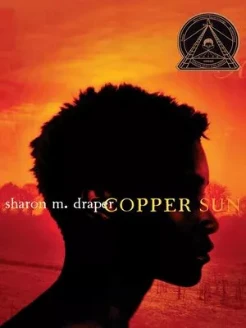"WHAT ARE YOU DOING UP there, Kwasi?" Amari asked her eight-year-old brother with a laugh. He had his legs wrapped around the trunk of the top of a coconut tree.
"For once I want to look a giraffe in the eye!" he shouted. "I wish to ask her what she has seen in her travels."
"What kind of warrior speaks to giraffes?" Amari teased. She loved listening to her brother's tales-everything was an adventure to him.
"A wise one," he replied mysteriously, "one who can see who is coming down the path to our village."
"Well, you look like a little monkey. Since you're up there, grab a coconut for Mother, but come down before you hurt yourself."
Kwasi scrambled down and tossed the coconut at his sister. "You should thank me, Amari, for my treetop adventure!" He grinned mischievously.
"Why?" she asked.
"I saw Besa walking through the forest, heading this way! I have seen how you tremble like a dove when he is near."
"You are the one who will be trembling if you do not get that coconut to Mother right away! And take her a few papayas and a pineapple as well. It will please her, and we shall have a delicious treat tonight." Amari could still smell the sweetness of the pineapple her mother had cut from its rough skin and sliced for the breakfast meal that morning.
Kwasi snatched back the coconut and ran off then, laughing and making kissing noises as he chanted, "Besa my love, Besa my love, Besa my love!" Amari pretended to chase him, but as soon as he was out of sight, she reached down into the small stream that flowed near Kwasi's tree and splashed water on her face.
Her village, Ziavi, lay just beyond the red dirt path down which Kwasi had disappeared. She headed there, walking leisurely, with just the slightest awareness of a certain new roundness to her hips and smoothness to her gait as she waited for Besa to catch up with her.
Amari loved the rusty brown dirt of Ziavi. The path, hard-packed from thousands of bare feet that had trod on it for decades, was flanked on both sides by fat, fruit-laden mango trees, the sweet smell of which always seemed to welcome her home. Ahead she could see the thatched roofs of the homes of her people, smoky cooking fires, and a chicken or two, scratching in the dirt.
She chuckled as she watched Tirza, a young woman about her own age, chasing one of her family's goats once again. That goat hated to be milked and always found a way to run off right at milking time. Tirza's mother had threatened several times to make stew of the hardheaded animal. Tirza waved at Amari, then dove after the goat, who had galloped into the undergrowth. Several of the old women, sitting in front of their huts soaking up sunshine, cackled with amusement.
To the left and apart from the other shelters in the village stood the home of the chief elder. It was larger than most, made of sturdy wood and bamboo, with thick thatch made from palm leaves making up the roof. The chief elder's two wives chattered cheerfully together as they pounded cassava fufu for his evening meal. Amari called out to them as she passed and bowed with respect.
She knew that she and her mother would soon be preparing the fufu for their own meal. She looked forward to the task-they would take turns pounding the vegetable into a wooden bowl with a stick almost as tall as Amari. Most of the time they got into such a good rhythm that her mother started tapping her feet and doing little dance steps as they worked. That always made Amari laugh.
